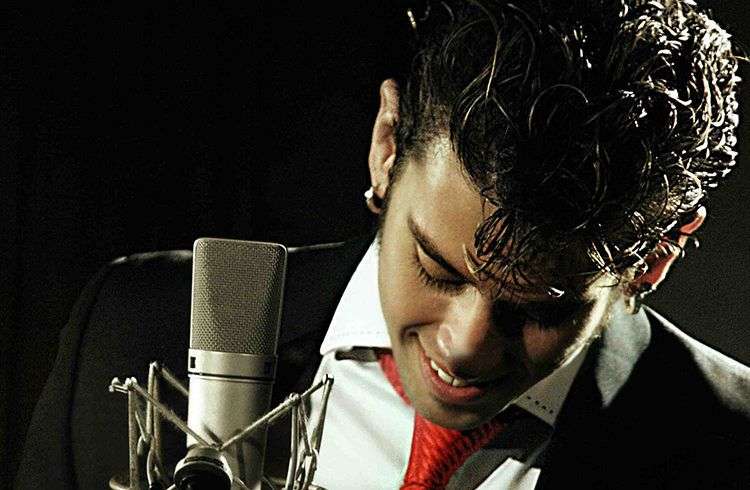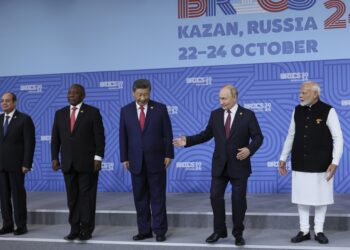Cristian Alejandro has moved from popular music to the television, and then to the cinema in his efforts to make his own way to the top. This young artist is also the son of one of Cuba’s most famous composers: Edesio Alejandro, and this fact presupposes a greater challenge in his career.
As if gaining his own space within the broad Cuban musical scenario was not challenge enough, Cristian has to be up to par with his father, who is an icon within Cuban filmography from the past 30 years.
What does it mean to be the son of Edesio Alejandro and to become a musician with that antecedent?
My father is my idol; he is definitely my best song. Since I was a child I have been listening to his music. I recall he was once in a tour in Matanzas, I was about four years old, and one of the technicians of the band gave me a guitar that could barely sound and during a small reception I decided to go up on the stage and started singing a few of his songs. He was greatly surprised because he couldn’t imagine at that age I had learn by heart all of his songs.
It is also a great challenge, because “being the son of…” always leaves a mark on you but I think it is rather a blessing, a course to follow and he is someone I can turn to whenever I have a question. As he is my father he can be really hard on me and is always demanding more from me but I don’t have how to thank him for all he has taught me and all I can grow from his knowledge.
Before revealing his influences and the immediate projects, this young composer and singer talked with OnCuba on the most outstanding aspects of his career:
“I started to study music at the age of seven at the Manuel Samuell Conservatory till the seventh grade when I moved to the Guillermo Tomas School, in Guanabacoa, where I finished high school and majored in electric guitar. At 15 I started writing and I formed a duet called Los Alejandros, with Alejandro Enriquez. Then, Xiomara Blanco gave me the chance to record the track for a TV series called Polvo en el Viento, which opened me the doors to the Cuban audience. From there I moved on with my project as soloist till the release of the song for the FIFA 2010 World Cup, Dame un gol, which was very popular here in Cuba.
“In 2011 I was invited to offer a concert in Miami, for the opening of an art gallery and it just happened that Pancho Céspedes attended the concert. Once again I was very lucky and he liked my music so he took me on a world tour opening his concerts. That was a huge opportunity for my career, I learned a lot, in addition to being close to that huge star, who is definitely a wizard in music. During that time I shared the stage with artists such as Armando Manzanero, Noel (singer of Sin Bandera) and for a year and a half we toured several countries like Venezuela, Brazil, Argentina, the United States, Spain, and Italy.”
Afro music has been a referent in your work for sure, to what extent have you moved away or not from it?
We made a musical entitled Viva Cuba with Yolena Alonso, Pachito Alonso’s daugther. It was premiered in Germany and it was basically about taking afro music to modern rhythms such as R & B, house and hip hop. Mixing all those rhythms was nice experience and even though I have always been close to afro music, pop rock certainly runs in my blood. I also like bachata, salsa, electronic merengue, all popular rhythms, but I am passionate about pop rock.
With the background of Edesio Alejandro’s contributions to the Cuban cinema, how much has he brought you close to this world?
The cinema has also been a great discovery for me and it pleases me. I started as coauthor of music for some documentaries as for instance, Los cien sones de Cuba, by Edesio Alejandro,which was nominated to a Latin Grammy and then I had the opportunity to make the music for the film Kangamba by Rogelio Paris, where Patricio Amaro, Edesio Alejandro and I wrote the track Amar es lo único importante.
I recall when we started working in this big project my dad was on a tour through Europe, so I sent him arrangements and he would send them back with his suggestions till three months after he realized I have my own way of understanding and creating the soundtrack for the film and he left me to work on my own. That was a huge step for me because it provided me with the necessary freedom to develop my own way of creation.
After that I produced the soundtrack for Boleto al Paraiso, by Eduardo Chijona and more recently I wrote a song for La pared de las palabras, Fernando Perez latest film.
Lately, there is another cinematographic project preventing the Rodriguez family from sleeping, it is the first full-length film produced by Edesio Alejandro and your debut in the cinema, how did this idea emerge and what’s the plot about?
Once the tour with Pancho Cespedes was over, I returned with a strong urge for working and we started to think on a way to promote my music; then my father told me about an idea to make his own movie and from there we both started working on this ambitious project.
Buscándote, el concierto is the title of this musical drama about an artist that is at the top of his career which makes him lose the love of his life: the classic romantic story but with the particularity that, as everything happens during a concert, the main character is faced with a dilemma: recovering the woman he is losing without turning his back on his audience.
It was also a different way to promote music through images, not only with a video clip but from a full-length fiction film in which the story is told through a large chain of actions that don’t demand dialogues to understand what it is about, and my music accompanies the narration of those events.
In what stage are you in right now?
We have said the date of the premiere several times and we have had to continue postponing it because postproduction is really expensive and slow. We are devoting all our strength and energy to premiere it in November during the film festival and we want to release it in parallel with a DVD with the soundtrack, that’s why I am working on the versions of the songs in popular rhythms so that everyone is familiar with them before the premiere of the film.
The plan is to screen the film in every movie theater in the country and, as it is gradually screened in the provinces, to offer a concert where the film is being displayed, and so travelled the island by using the cinema and music.
In addition to sharing the main role with Canadian actress Cinthya Art, the film has given you the possibility to sing with Adriano Rodriguez, how much have you taken from this experience?
Adriano is family to me, he is 90 years old and he still has an incredible voice. Though I already knew many anthological songs by the traditional trova movement, standing by Adriano was definitely a challenge and at the same time a tremendous privilege. I also had to study because I don’t master this genre and although I tried to adjust it in my own style I think we always have to go back to the classics and reveal what can come out of that generational meeting.
To accompany the premiere of the film with a national tour is a huge challenge, is there any other work or album to be released soon?
I am preparing a record with duets where I sing with Puerto Rican Danny Rivera, who allowed me to take part in his latest production and as a result from that song I decided to create this album with duets. I have also invited Carlos Varela; Omara Portuondo; Buena Fe; PanchoCéspedes; Tanya; Adriano Rodríguez, with whom I interpreted “Si me pudieras querer”, that beautiful song by Bola de Nieve Hernán López Nusa’s trio incredibly revived. Summing up, you have to be close to great figures to become popular and grow as an artist.










